
Author
Board of 2025-26
Board of 2025-26
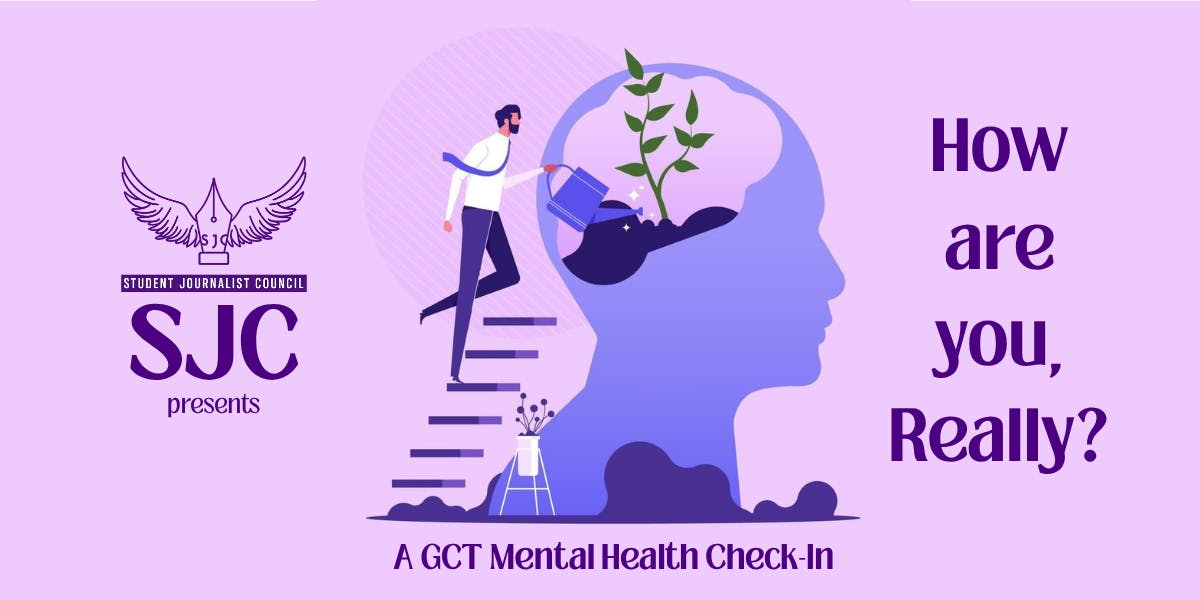
The GCT Student Journalist Council asked 88 students a straightforward question on October 10th, World Mental Health Day: How are you, really?
The responses uncover an obvious truth. Despite the visible academic achievements and vibrant campus life, many students quietly face emotional challenges rarely spoken about. These struggles include self-doubt, comparison, and over-analyzing, which overshadow even the pressure of exams and placements.
With 47.7% of the responses, third-year students predominated, followed by second-year with 37.5%. With career concerns looming but no end in sight, these students are in the thick of college life, past the adjustment period and deep into the pressure cooker. This isn't just data. It’s a mirror reflecting what many of us feel but rarely say out loud.
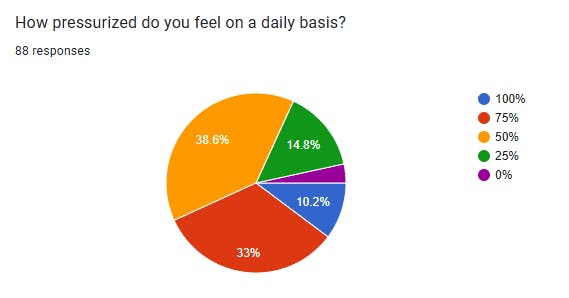
1
1. How pressurized do you feel daily?
Most students, over 80% said they often feel pressurized, showing that stress is a constant part of campus life. Even though they are attending a prestigious university, students report experiencing intense daily pressure. This shows that pressure is a constant companion, a baseline hum of stress that permeates daily campus life rather than an isolated spike. Constant internal and external expectations make it difficult for students to rest without feeling guilty, as if taking a break means losing progress.
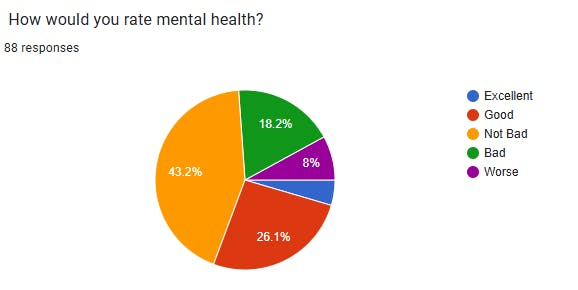
2
2. How would you rate your mental health?
Nearly three-quarters shared that they're managing their mental health fairly well, even if just barely keeping up with demands. Only a small portion of students describe their mental health as "excellent," while about a quarter rate it as "good." A dominant portion says it is simply "not bad", a lukewarm assessment that speaks volumes. This hedging of language, "not bad" instead of "good," reveals a generation that has normalized struggling, where "surviving" has taken the place of "thriving" as the benchmark for mental health and the absence of crisis is mistaken for wellness. It should serve as a wake-up call that less than half of students can honestly describe their mental health as "good".
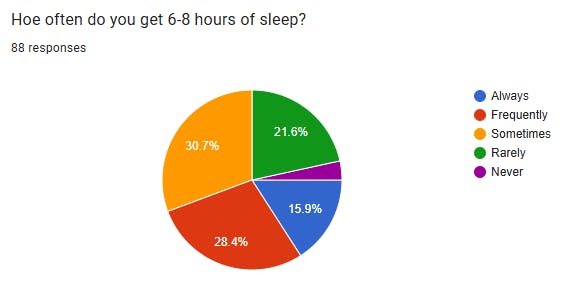
3
3. How often do you get 6-8 hours of sleep?
Close to 55% reported not getting the recommended 6–8 hours of sleep, highlighting how rest often takes a backseat. According to the survey, this indicates a worrying pattern of sleep deprivation among students. Nearly a third report only "sometimes" getting enough sleep. More than just fatigue, this ongoing sleep deprivation is a silent epidemic that threatens emotional control, cognitive function, and general well-being. Students are making a Faustian trade-off between productivity and rest that leaves them constantly exhausted.
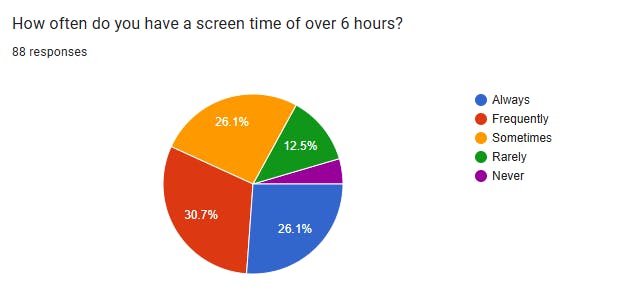
4
4. How often do you have a screen time of over 6 hours?
More than half, around 56% said their daily screen time stretches beyond six hours. Digital consumption has become the norm rather than the exception. In terms of education, entertainment, social interaction or the never-ending scroll of comparison, this depicts a generation whose lives are increasingly mediated through screens. This constant exposure blurs the line between purposeful screen use and passive scrolling, fostering habits that may worsen mental health struggles.
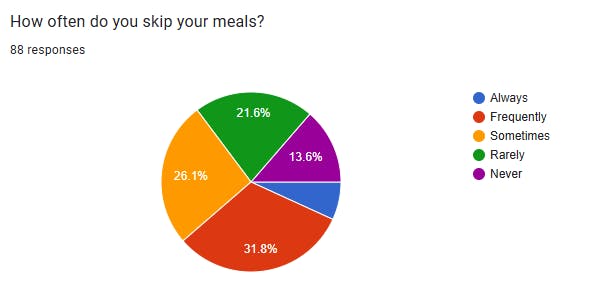
5
5. How often do you skip your meals?
Only a small group, roughly 7% said they never skip their meals. A startlingly high percentage of students frequently skip meals, and many do so occasionally. Time constraints, stress-induced appetite loss, or simply forgetting to eat in the midst of the chaos can all contribute to this disturbed relationship with food, which suggests a more serious problem with self-care being neglected in favor of other demands. A culture where students have internalized the idea that productivity is more important than their physical needs is reflected when basic food is made negotiable.
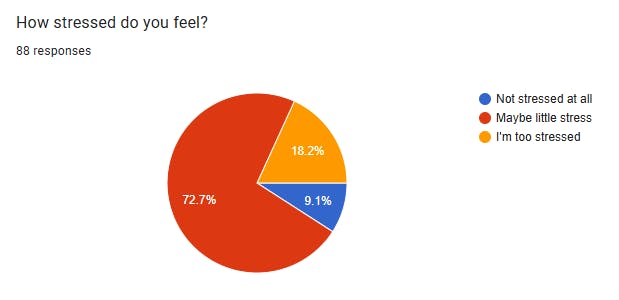
6
6. How stressed do you feel?
Just 9% mentioned that they rarely feel stressed. The majority of students now consider stress to be their emotional baseline. It is especially telling that this category is so common; it implies that students have grown so used to stress that moderate levels seem normal, almost unremarkable.
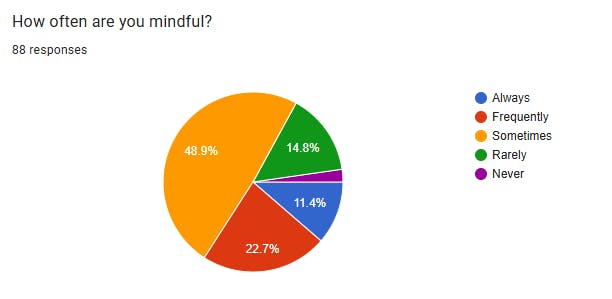
7
7. How often are you mindful?
Around 11% said they are consistently mindful in their day-to-day lives. Nearly half of students say they are only "sometimes" mindful, while others say they rarely attain this state. However, the data shows a notable lack of mindfulness; nearly two-thirds of students find it difficult to maintain a grounded and present moment awareness. Students are always caught between dwelling on the past and worrying about the future in an environment.
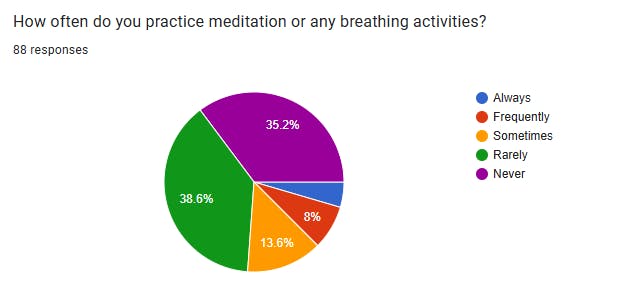
8
8. How often do you practice meditation or any breathing activities?
About 8% said they regularly practice meditation or breathing exercises. Students still under utilize breathing techniques and meditation, despite increased awareness of mental health resources. While students may have an intellectual understanding of the advantages of mindfulness practices, this gap between awareness and action indicates that adoption barriers such as time, energy, skepticism or simply not knowing where to begin remain significant.
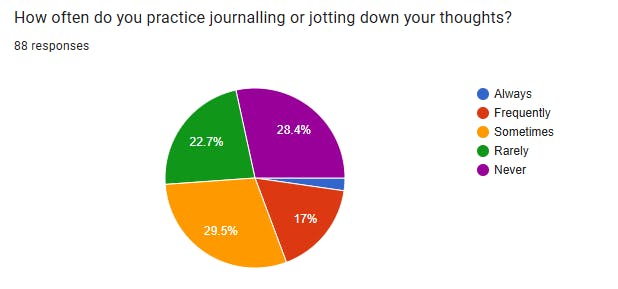
9
9. How often do you practice journaling or jotting down your thoughts?
A tiny fraction maintains a journaling habit, showing how rare this reflective practice is among students. The use of journaling as a reflective practice varies among students. Nonetheless, a considerable portion say they "never" journal. This indicates that although almost half of the students have tried written reflection, most have not made it a regular practice. The quiet act of journaling may seem indulgent or ineffective in a culture that values outward success over inward thought, but for those who engage in it, journaling can provide a unique platform for raw emotional processing and self-expression.
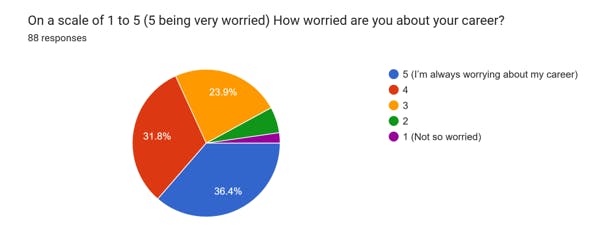
10
10. On a scale of 1 to 5 (5 being very worried), how worried are you about your career?
Close to 88% expressed concern about their career. Students are very concerned about their careers. High-stakes career outcomes in competitive institutions, where the pressure to land the "right" internship or placement can feel existential, are reflected in this widespread anxiety
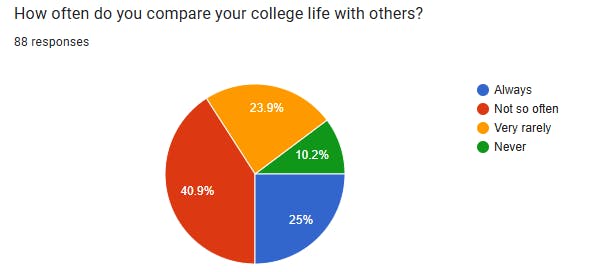
11
11. How often do you compare your college life with others?
Over 65% acknowledged frequently comparing their college life with others. The practice of social comparison is ingrained in college life. Discussions about peers' achievements often trigger self-comparison and feelings of inadequacy. Students find themselves caught in a tiresome race where the finish line never stops moving in a place full of high achievers.
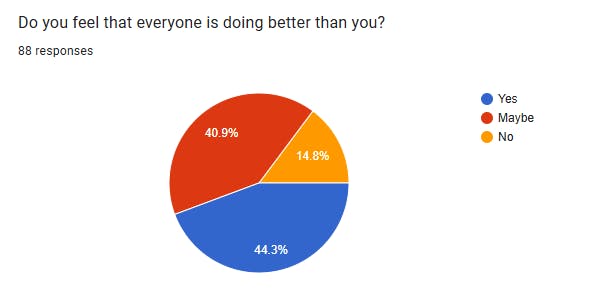
12
12. Do you feel that everyone is doing better than you?
Around 85% sometimes feel that everyone else is doing better than them. A staggering 44.3% say they consistently believe that everyone is doing better than they are. Regardless of how true this belief is, it affects their emotional reality and sense of value. Even for objectively successful students, this pervasive feeling of falling behind suggests that the internal voice of inadequacy is never completely silenced by outward accomplishments.
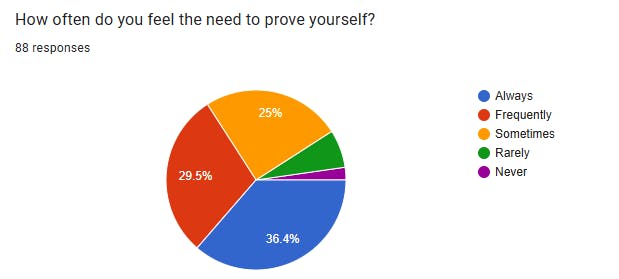
13
13. How often do you feel the need to prove yourself?
Nearly 66% said they often feel the need to prove themselves. The push to always prove oneself is unrelenting. This relentless cycle of continuous performance, where rest equates to stagnation and each interaction is a moment to prove credibility, keeps students in a state of perpetual self-consciousness. The requirement to establish oneself implies an acute doubt regarding one's intrinsic value, wherein worth has to be constantly earned instead of presumptuously held.
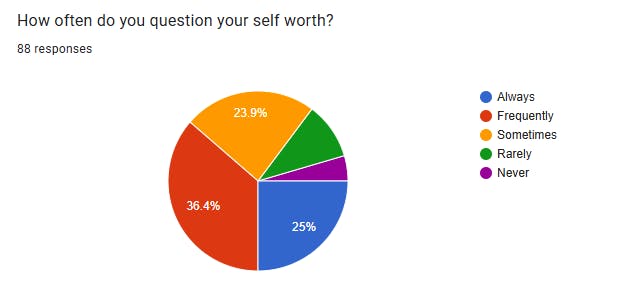
14
14. How often do you question your self-worth?
Over 61% admitted that they frequently question their self-worth. For certain students, self-doubt has become a constant companion. All of these points to a crisis of confidence and an inner questioning of one's worth resting just beneath academic success, an ongoing voice that asks if one actually belongs here, if one earned this success or if one was merely lucky. Having this inner questioning of self-worth could be considered the most permanent form of stress.
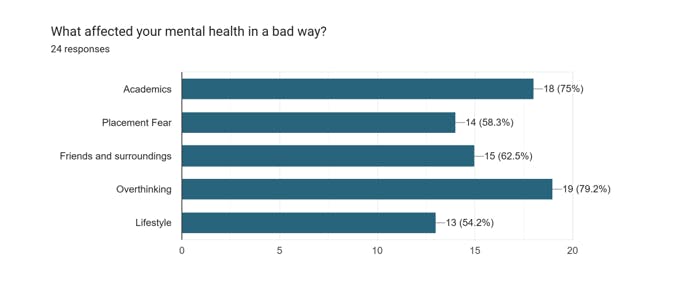
15
15. What affected your mental health in a bad way?
Close to 79% identified overthinking as negatively impacting their mental health, followed by friends and surroundings at around 63%. In one of the more insightful findings from the survey, overthinking was the most considerable and negatively influencing factor on students' mental health, followed by friends and environmental impacts. These invisible struggles overshadow both the more recognizable academic and placement pressures, while lifestyle also had an impact. This inversion of expected priorities reveals that the most persistent battles may not be against external pressures like deadlines, interviews or GPAs, but against the internal landscape of our own minds and the complex social ecosystem we live in or inhabit. This finding suggests that in a campus environment where academic excellence is given, the quieter struggles, the endless overthinking, the unspoken tension in friendships, the exhausting mental load of social navigation, these things are shaping students' psychological well-being silently.
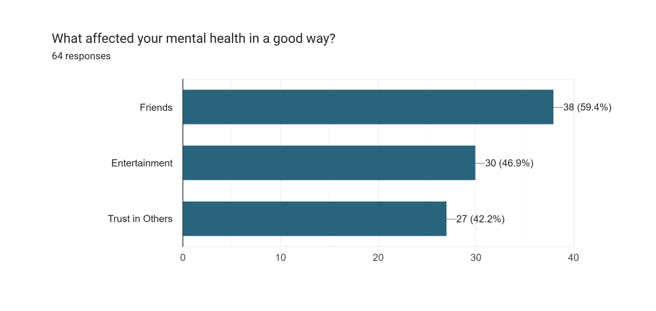
16
16. What affected your mental health in a good way?
The most beneficial influence on mental health was found to be friends, followed by entertainment. These results provide a positive contrast to the difficulties that have been exposed elsewhere. Friends are lifelines. They understand the pressure because they are also going through it, even though sometimes it can be stressful. The necessary breathing room, those moments of escape that make the grind bearable, is provided by entertainment. Students are reminded that they don't have to bear everything alone when they have faith in others. These encouraging factors demonstrate that students are finding support, camaraderie and motivation to persevere despite the pervasive stress.
Conclusion
This survey reveals 88 students carrying invisible weights 79% overthink to the point of exhaustion, 44% believe they are behind, and most students suffer from too little sleep and too much doubt. We've mistaken burnout for ambition, anxiety for motivation and survival for success.
Ten years from now, you won't remember your second-year GPA. But your mind will remember how you treated it.
Mental health isn't watching self-care videos and motivational quotes. It's the difference between living and merely existing. Between building something meaningful and burning out before you even begin. You wouldn't run a phone at 7% battery for days and expect peak performance. Yet we expect our minds to function flawlessly while running on inadequate sleep, constant stress, and zero mental rest. The students in this survey aren't failing “The system that taught them their worth equals their output is failing.”
So ask yourself, “Am I building a life I'll want to live in? Or am I constructing a prison of expectations, comparisons, perpetual inadequacy?”
Your mental health isn't everything. But without it, everything else is nothing.
This World Mental Health Day, the Student Journalist Council asks, “What's the point of reaching the top if you're too broken to enjoy the view?”
Credits:
Patron: Dr. K. Manonmani, Principal of GCT
Staff In-charge: Dr. M. Kalpana
Editor in Chief: Mathimalar V (IT 23-27)
Article prepared by: Mathimalar V (IT 23-27)
DISCLAIMER: The opinions or views expressed are views of the individual writers and not of the institution. All forms of content published in this website and Student Journalist Council - GCT's social media handles are strictly properties of Student Journalist Council - GCT and are works of the various teams of the respective academic years.
No article, story or any form of content produced by Student Journalist Council - GCT is meant to be reproduced or distributed, either in parts or whole, without prior permission from Student Journalist Council - GCT for any purposes.